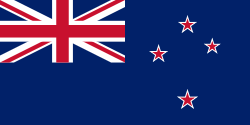| New Zealand at the 1932 Summer Olympics | |
|---|---|
 | |
| IOC code | NZL |
| NOC | New Zealand Olympic and British Empire Games Association |
| Website | www |
| in Los Angeles | |
| Competitors | 21 in 4 sports |
| Flag bearer | Jack Macdonald (rower) |
| Medals Ranked 22nd |
|
| Summer Olympics appearances (overview) | |
| Other related appearances | |
New Zealand competed at the 1932 Summer Olympics in Los Angeles, United States. The team of 21 was New Zealand's largest to date and comprised 11 rowers, six athletes, three boxers, and one cyclist. The officials were manager Philip Rundle [1] of Dunedin, [2] boxing and athletic coach W. J. Heenan, and rowing coach Clarrie Healey. [3]
Contents
An innovation was the daily one-hour radio report on the Olympics for New Zealand and Australia by the film actress from New Zealand, Nola Luxford.
